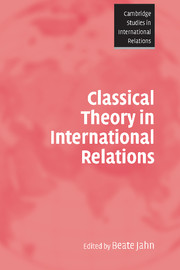Book contents
- Frontmatter
- Contents
- Notes on contributors
- Acknowledgements
- 1 Classical theory and international relations in context
- Part I Intellectual contexts
- Part II Political contexts
- Part III Lineages
- 9 The ‘other’ in classical political theory: re-contextualizing the cosmopolitan/communitarian debate
- 10 Images of Grotius
- 11 The Hobbesian theory of international relations: three traditions
- 12 Re-appropriating Clausewitz: the neglected dimensions of counter-strategic thought
- Index
- CAMBRIDGE STUDIES IN INTERNATIONAL RELATIONS
10 - Images of Grotius
Published online by Cambridge University Press: 22 September 2009
- Frontmatter
- Contents
- Notes on contributors
- Acknowledgements
- 1 Classical theory and international relations in context
- Part I Intellectual contexts
- Part II Political contexts
- Part III Lineages
- 9 The ‘other’ in classical political theory: re-contextualizing the cosmopolitan/communitarian debate
- 10 Images of Grotius
- 11 The Hobbesian theory of international relations: three traditions
- 12 Re-appropriating Clausewitz: the neglected dimensions of counter-strategic thought
- Index
- CAMBRIDGE STUDIES IN INTERNATIONAL RELATIONS
Summary
The literature on the history of ideas about international politics is overwhelmingly devoted to a small group of ‘great thinkers’: Thucydides, Augustine, Machiavelli, Grotius, Hobbes, Rousseau, Burke, Kant, Hegel, Marx and Nietzsche. Even as their works have been reinterpreted in novel ways, these thinkers have retained their position at the centre of historical scholarship, often at the expense of others. Thucydides, for example, no longer enjoys an unquestioned title to be the original author of the theory of the balance of power, but he is still the subject of a flourishing ‘cottage industry’ in International Relations theory that must be the envy of other ancient historians, such as Herodotus. Machiavelli's satanic reputation as the master of Realpolitik may have acquired a more benign aspect as we become more familiar with his republican sympathies, but his ability to overshadow early-modern reason of state theorists such as Francesco Guicciardini has not been lessened by the considerable reappraisal of ‘Machiavellism’ that has taken place from, say, Friedrich Meinecke to R. B. J. Walker. Kant's thought about international relations has undergone any number of new formulations in recent years, but he is still generally acknowledged as one of the pivotal thinkers about international politics in the modern period, while other equally worthy thinkers from his period – Denis Diderot and Johann Gottfried Herder, for instance – languish in relative obscurity.
- Type
- Chapter
- Information
- Classical Theory in International Relations , pp. 233 - 252Publisher: Cambridge University PressPrint publication year: 2006
- 2
- Cited by

